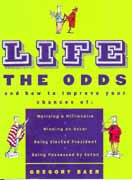
Life: The Odds

Weighing the Odds in Sports Betting
Players Now Control 15-30% of Casino Game Outcomes Through Skill-Based Mechanics
Back in the time, casino games meant only pulling a lever and hoping for the best – but now, those days are dead. Current players shoot aliens for multipliers, time their cashouts in crash games, There are occasions when we here at ReadyBetGo want to bring you interesting facts about the gambling industry When something catches our eye, we will publish it for your enjoyment.
There are occasions when we here at ReadyBetGo want to bring you interesting facts about the gambling industry When something catches our eye, we will publish it for your enjoyment. 
and compete in real-time poker tournaments where reflexes are as important as strategy.
The numbers are saying that 30% of US adults gambled during Q2 2025, which is more than 25% we had a year earlier – but Gen Z and Millennial bettors are behind this growth.
Arcade Shooters and Puzzle Games Replace Old-School Slots
So, walk into any modern online casino and you'll find games that look more like mobile apps than gambling – arcade-style casino games now have shooting, racing, and puzzle-solving elements where you can compete for high scores that determine the winnings.
Take Danger Arena – you're literally shooting bots in a first-person perspective, and your accuracy determines your payout. Hybrid slot machines promote bonus rounds based on skills, where players get into mini-games and increase their chances of winning.
Well, platforms report 23% higher engagement rates among under-35 players when skill elements are present. Session times jump by 18 minutes, and most importantly – six-month retention rates climb from 31% to 47% when players have both skill and chance options.
The Texas market shows how players adapt when options are limited. So, while the state restricts regular casinos, thousands of Texans play on offshore platforms. Gambling expert Matt Bastock recently reviewed some real money online casino texas sites that have massive game selections with skill-based options, impressive welcome bonuses, and banking from credit cards to crypto.
Millennials Bet Weekly While Gen Z Plays Every Day
Since younger generations grew up with video games, they now love the skill component these casino games bring to the table. The data gets specific: 17% of Gen Z bet daily, while 51% of millennials prefer weekly sessions – and 80% do it for fun.
But these players don't just want different payment schedules – they actually want all kinds of experiences. So, by bringing levels, achievements, and leaderboards, casinos make a bridge between old-school gambling and modern video gaming.
Think about what this generation considers normal entertainment – well, they grind ranked matches in Call of Duty, chase high scores in mobile games, watch esports tournaments – random number generators feel outdated to seasoned players who expect their skills to take over.
Blockchain Verifies Every Skill-Based Win
Blockchain tech gives an immutable ledger which makes sure that every transaction and outcome is transparent and verifiable. Smart contracts automatically pay out based on your performance metrics – so, if you hit 80% accuracy in that shooting bonus, the blockchain will confirm it and trigger your payout at the same moment.
Such transparency is trying to build trust in ways regular casinos never could. Players need to believe their skill truly influences outcomes. But platforms now show you detailed statistics – performance metrics, success rates, community comparisons… and third-party auditors verify that skill impacts 15-30% of outcome variance, enough to feel meaningful without eliminating the house edge.
Legal Loopholes Let Skill Games Enter 29 States
Skill-based games blur the lines between gambling and gaming, which creates pretty complex legal situations. Jake Paul's Betr Arcade exploits this just perfectly – working in 29 states, including California, Florida, and Texas, where online casino play isn't permitted.
The distinction is very important, and pure skill games usually dodge gambling regulations entirely. Hybrid models occupy gray areas that change state by state. Operators spend millions calibrating their skill-to-chance ratios to meet some specific requirements. So, if there’s too much skill, nobody will gamble – but if there's too little, players will get bored.
Players Stream Their Skills for Thousands of Viewers
Competition powers literally everything now. Weekly tournaments pit players against each other with prize pools funded by entry fees, and not house money. Leading players stream on Twitch, building audiences like regular esports stars.
Crash games ask players to cash out before the game crashes – the trick is not getting too greedy. So, watch any stream of these games and you'll see the social pressure when everyone sees others cash out. Some platforms even bring skill multipliers – predict patterns correctly over more rounds and unlock bonuses.
Could We See the $8.3 Billion Future Arriving in 2027?
Seasoned players appreciate that winning chances aren't only dependent on random chance but on their ability to apply skills effectively. Such a change of perception can open some massive markets. Surveys show 67% of non-gamblers would try skill-based casino games versus only 31% interested in regular formats.
Analysts predicted the global skill-based casino gaming market will hit $8.3 billion by 2027, getting bigger by almost 20% per year.
Video game companies now hunt gambling markets while casinos hire developers from Epic Games and Riot Games – and the boundaries disappear. Soon you won't distinguish between competitive mobile games with cash prizes and skill-based casino games – because there won't be any difference.

